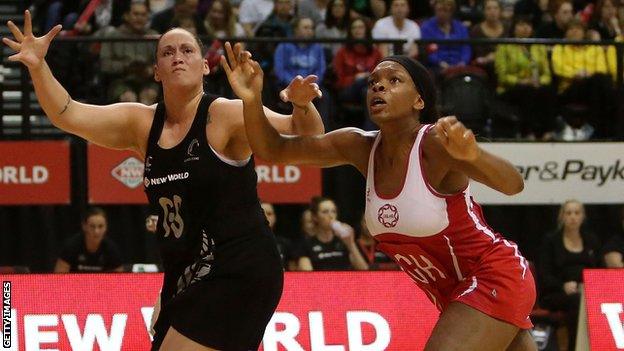Netball Superleague must pay players, says England defender
- Published

England netball stars will continue to ply their trade abroad unless they are paid to play in the UK, says England defender Eboni Beckford-Chambers.
The 24-year-old moved to Australia to play for West Coast Fever in 2012.
Netball's top-flight Superleague comprises eight franchises in England and Wales, but does not pay players.
Beckford-Chambers said: "Some of the legends of the game in Australia are professional and rightly so. Players like me aspire to be like that."
England are set to take on Australia Diamonds in a three-match series starting on Sunday 20 January.
It is the first time for three years the number-one ranked team in the world have visited the UK and presents an opportunity for the England team to gauge how they are performing ahead of the Commonwealth Games in Glasgow in 2014.
Netball toughens up its image
Participation in netball in England has increased by 30% over the last three years thanks to schemes like "Back to Netball", external run by England Netball and designed to get young women to take up the sport again.
Sport England said that netball "showed an understanding of what women want from sport" when handing out their latest round of funding for 2013-2017.
England's first game against Australia in Bath on Sunday is a sell-out and the matches at Wembley Arena and Birmingham's National Indoor Arena are also selling well. The Netball Superleague is shown live on pay television after a deal was struck in 2006.
So with the growth of the sport in this country very evident, Beckford-Chambers explained her decision to leave the country after she finished studying was motivated by the desire to play her sport professionally.
"In terms of the Superleague, we are not quite there in terms of being paid," said Beckford-Chambers, who will return to Perth to begin the new season with her club immediately after the series.
"That's the vision for the next five or 10 years, hopefully to develop the league and attract players from ANZ [the Australia and New Zealand combined league] to want to come over and play here.
"It is small steps but that's definitely the vision for where we want to go."
The ANZ operates a salary-cap system for each franchise and 12 players are contracted to each team, with one import allowed.
But Beckford-Chambers explains that the differences in the sport in the two countries are "not just monetary".
"In Australia, there are also other advantages like scholarships with schooling so it's more of a package that can be offered," she said.
"Because of the semi-professional and professional attraction there are a lot more athletes between the 16 and 24 age group who are willing to stay in the sport and commit to the training.
"Also, in Australia, the sport is very much part of the culture.
"Over there women's sport is much more at the forefront of the media, as well as the men, so girls consider sport as a viable option.
"They are able to both earn a living or go to school and university and play sport and it's not perceived as detrimental which it sometimes is over here."
Beckford-Chambers, who says she is regularly recognised in the street in Australia, began her netball career with a club side in Surrey before moving to train with Team Bath while studying law at Bristol University.
And she explains that moving to Australia has enabled her to combine the two.
She said: "When I'm in Perth, I'm a trainee solicitor at the same time and the company I work for are very accommodating in terms of allowing me to go into the firm and work and keep up that side of my academics.
"This makes sure I'm on the right path for when I exit netball.
"It's one of the things in England we can build upon in terms of how the Australian community get behind their athletes and accommodate them.
"That's why we go away - because we can find that flexibility in terms of training all those hours but also working on a part-time basis so hopefully we can replicate that here."
Netball is not an Olympic sport and despite an increase of more than 30% in grassroots funding from Sport England, which helps the England team cover expenses for travel and accommodation, international players will have to continue to work alongside their training.
Beckford-Chambers was part of campaign prior to the London Olympics to see the sport included in the Games.
She set up a Facebook group which had more than 40,000 followers and the campaign gained a big sponsor in the shape of Co-operative as well as the backing of celebrities, sports stars and the then Prime Minister Gordon Brown.
"It's always going to be a vision," she said. "I made a start and it's going to be a long journey but it's important not to be disheartened.
"It's a work in progress. As long as we get enough people who want to see it at the Olympics and are willing to do something to make changes, we can make it happen."
She explains that after meetings with the International Federation of Netball Associations (IFNA) the suggestion is the sport is not yet played in enough jurisdictions.
"It's a development issue," she said.
"We need to bring it to Russia, China, America and Europe, and grow the sport. With their inclusion it can hopefully gain Olympic status.
"There are efforts in India and Africa. Malawi is one of the new countries to come out of Africa who are exciting, and have a different flair and a different style.
"The end goal may be in 2050 or whenever but one day I'm confident netball will become an Olympic sport."
- Published13 January 2013
- Published17 December 2012
- Published11 December 2012